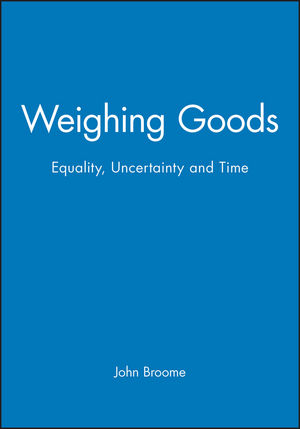Weighing Goods: Equality, Uncertainty and TimeISBN: 978-0-631-19972-4
Paperback
268 pages
November 1995, Wiley-Blackwell
 This is a Print-on-Demand title. It will be printed specifically to fill your order. Please allow an additional 10-15 days delivery time. The book is not returnable.
|
||||||
Preface ix
1 Introduction I: The Structure of Good 1
1.1 Acts versus consequences, and agent relativity 3
1.2 The Working of ethical considerations 6
1.3 Teleological structure 10
1.4 Does good exist? 17
Notes 20
2 Introduction II: Weighing Goods 22
2.1 Locations of good, and separability 22
2.2 Three dimensions of locations 25
2.3 Dimensions with varying lengths 29
2.4 What things are good? 32
2.5 An outline of the argument 32
Notes 58
3 Similarity Arguments 39
3.1 Parfit, Section 1 40
3.2 Parfit, Section 2 48
3.3 Harsanyi 51
Notes 58
4 The Separability Theorems 60
4.1 Two examples 60
4.2 Definitions and theorems 65
4.3 The significance of additive separability 70
4.4 The rectangular field assumption 80
Notes 81
Appendix to Chapter 4: Proofs 82
5 Expected Utility and Rationality 90
5.1 Axiomatic expected utility theory 90
5.2 The sure-thing principle 94
5.3 Individuation of outcomes 95
5.4 Transitivity of preferences 100
5.5 Rational requirements of indifference 104
5.6 Individuation and the sure-thing principle 107
5.7 The dispersion of value amongst states of nature 110
5.8 The rectangular field assumption 115
Notes 117
6 The Coherence of Good 121
6.1 The goodness of uncertain prospects 122
6.2 Betterness and rational preferences 131
6.3 The argument for coherence 136
6.4 Representing betterness by utility 139
6.5 Bernoulli’s hypothesis 142
Notes 148
7 Coherence Against the Pareto Principle 151
7.1 The conflict 152
7.2 Two better principles 154
7.3 Welfare economics 159
Notes 164
8 The Principle of Personal Good 165
8.1 Qualifications 165
8.2 The beginning of a defence 167
Notes 173
9 Equality 174
9.1 A utilitarian case for equality 175
9.2 Types of egalitarianism 177
9.3 Equality under uncertainty 185
9.4 Fairness and equality 192
Notes 200
10 The Interpersonal Addition Theorem 202
10.1 Proof 203
10.2 Connecting dimensions 209
10.3 The utilitarian principle of distribution 213
Notes 222
11 Utilitarian Metaphysics? 224
11.1 The intertemporal addition theorem 224
11.2 The principle of temporal good 228
11.3 The metaphysical argument 230
11.4 Conclusion 237
Notes 240
Bibliography 241
Index 251



